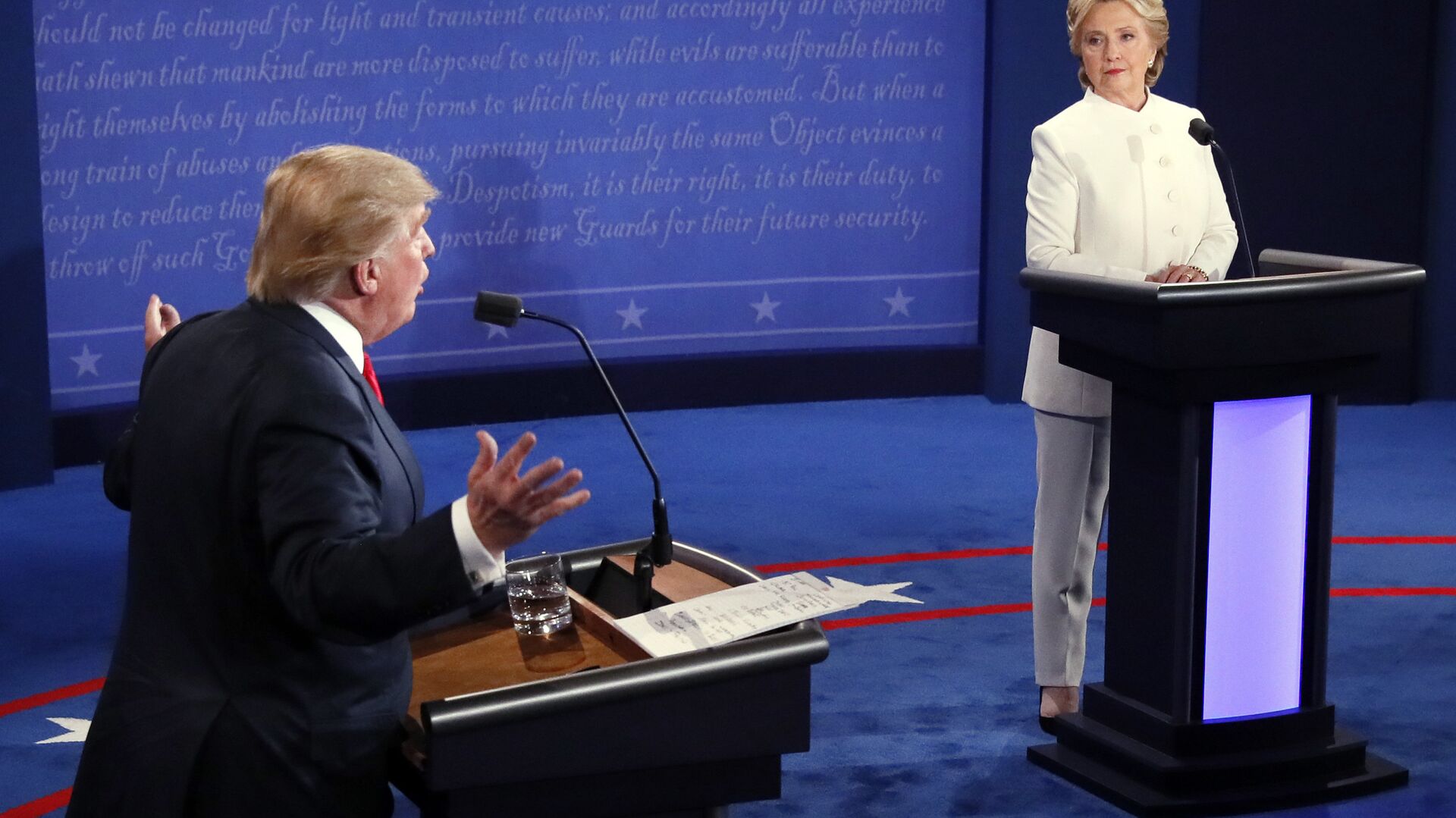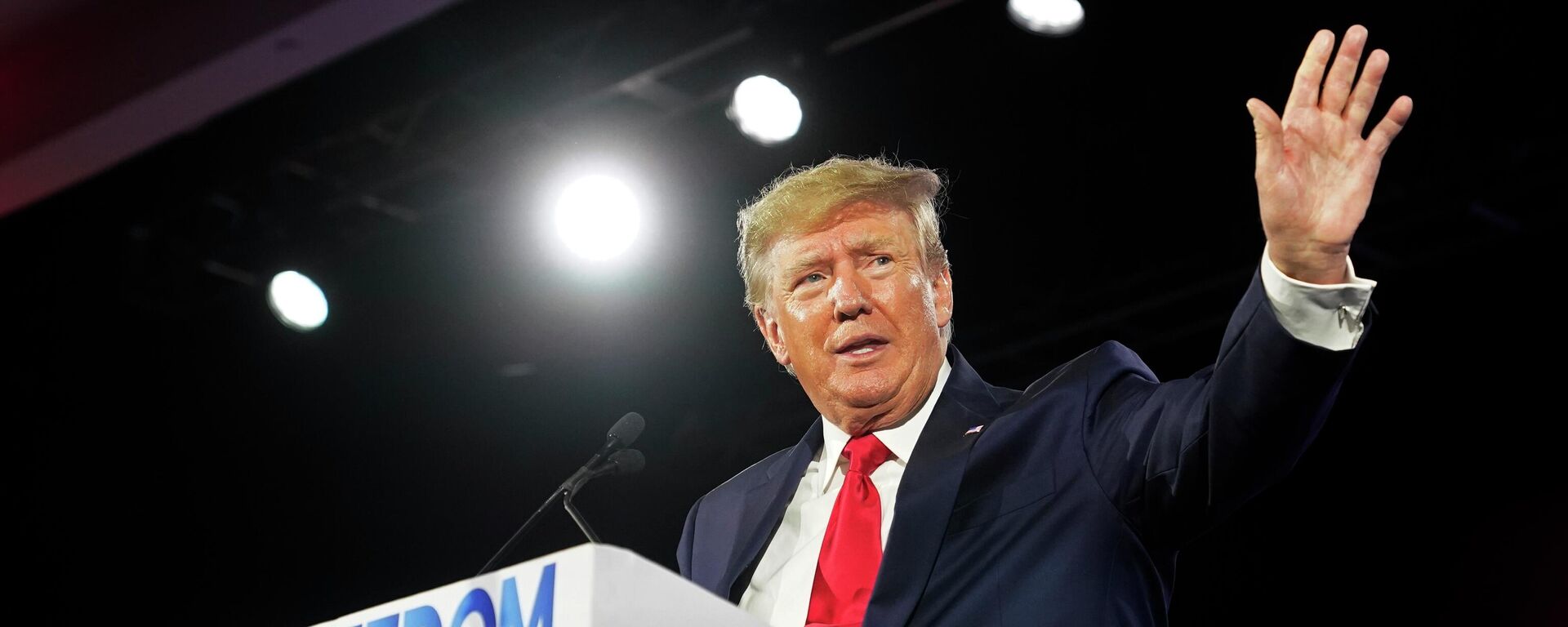'But Her Emails': Why Clinton and Trump's Espionage Act Cases Were Treated so Differently

© AP Photo / Mark Ralston/Pool
Subscribe
Former US President Donald Trump is reportedly being investigated for violating the 1917 Espionage Act, as he withheld classified information. Ex-Secretary of State Hillary Clinton also stored classified materials on an unsecured server and even deleted numerous emails, some observers have noted, stressing that the FBI let her off the hook.
"The decision by [former US President] Barack Obama and his top advisors to let Hillary transact all of her duties as Secretary of State using unvetted electronic devices and over private servers seems a gross dereliction of duties if not a set of crimes on its own," says Charles Ortel, a Wall Street analyst and investigative journalist.
"Then, allowing Hillary and her conflicted team of co-conspirators to retain possession of government records after she left her post leading the State Department is tough to explain unless Hillary had leverage over Obama. Furthermore, resisting subpoenas and likely destroying records implicating her and associates in potential crimes is normally not tolerated."
Hillary Clinton stepped down as US secretary of state in 2012. However, as early as 2009, officials with the National Archives and Records Administration (NARA) expressed concerns over possible violations of normal federal government record-keeping procedures by Clinton and her cabinet. It later turned out that Clinton used unsecured devices and a private email server for government email exchanges.
On December 5, 2014, Clinton's legal team handed over 30,000 emails to the government. Still, the former secretary of state withheld almost 32,000 emails deemed to be of a personal nature which were reportedly deleted.
The Clinton 'emailgate' saga captured headlines during the 2015/2016 presidential cycle, with the FBI launching an investigation into the case in the summer of 2015. On July 5, 2016, then-FBI Director James Comey said in a statement that "from the group of 30,000 emails returned to the State Department, 110 emails in 52 email chains have been determined by the owning agency to contain classified information at the time they were sent or received."
"Eight of those chains contained information that was Top Secret at the time they were sent; 36 chains contained Secret information at the time; and eight contained confidential information, which is the lowest level of classification," Comey's official statement read.
To make matters worse, those messages had been sent or received through unsecure, unclassified channels on Clinton’s private email network, the FBI underscored at the time. Even though the bureau found no direct evidence the network was hacked, Comey said it was possible some "hostile actors" may have done so. Comey highlighted the former secretary of state and her aides had been "extremely careless in their handling of very sensitive, highly classified information," but he recommended no criminal charges against Hillary Clinton.
Commenting on Comey's decision, the US press, including Time magazine and War on Rocks, explained that the Clinton 'emailgate' case pertained to two statutes of the 1917 Espionage Act, namely 18 U.S. Code Section 1924 and 18 U.S. Code Section 793.
"The first, Section 1924, makes it a misdemeanor for any person entrusted with classified information to intentionally remove that information from its proper place of storage," wrote John Ford, a former military prosecutor and a current reserve US Army Judge Advocate in his January 2017 op-ed. "The second, Section 793, makes it a felony for any person entrusted with classified information to remove the information from its proper place of storage with the intent to harm the national interests of the United States."
However, according to Ford, Clinton could not be charged under either of the two sections as it would be impossible to prove a criminal intent behind her actions. The former military prosecutor noted that Comey's investigation into Hillary's emails was focused on Section 793. However, the Espionage Act is vague, with "the gross negligence language in Section 793" being "a mirage," the reserve US Army Judge Advocate stressed at the time.
Time magazine also admitted in July 2016 that "law enforcement officials have set a high bar for prosecuting violations of those laws [Section 1924 and Section 793], looking for clear criminal intent."

Client-Attorney Privilege & Earmarks of Fishing Expedition: FBI's Mar-a-Lago Raid Triggers Questions
14 August 2022, 17:31 GMT
Trump Case Vs. Clinton Case
According to CBS News, Donald Trump is also being probed for supposedly violating Section 793 of the Espionage Law. It raises questions as to whether the Department of Justice (DoJ) and the FBI could prove that the former president had a "clear criminal intent" to store classified materials in his home. However, when it comes to Trump, the US mainstream media says that the 1917 act's "gross negligence standard" is no mirage: "The Espionage Act includes a gross negligence standard, meaning a prosecutor does not have to prove criminal intent," claimed the New York Times.
Conservative observers and Trump supporters insist that the US press and the DoJ adopted a double-standard approach in Trump and Clinton's cases. Former Pentagon Chief of Staff Kash Patel lashed out at the DoJ and the FBI over the "two-tiered 'justice' system" in his August 12 tweet: "Remember: the government allowed Hillary's lawyers to keep emails from her private server in her broom closet that were classified up to Top Secret/Special Access Program, in her office."
Likewise, it is unclear why the DoJ dispatched 30 FBI agents to break into Trump's home while Hillary Clinton's property was never raided. Still, Politico asserted to its readers on August 14 that "if you or I had some 21 boxes of potentially classified information in our home, the Feds wouldn’t ask for it politely or even issue a subpoena; they would have taken possession of that material right away, and we would face serious charges." However, nothing of that kind happened to Hillary, as Patel noted on August 12.
Meanwhile, Donald Trump argues that all the materials in his possession were declassified. Patel also insists that the documents stored at Mar-a-Lago were declassified when Trump left office in January 2021. "It had to do with Russiagate. It had to do with the Hillary email scandal. It had to do with a whole lot of other stuff," Patel told the Wall Street Journal on August 21.
What was allowed for Clinton and some other government officials was not allowed for Trump, says Charles Ortel.
"Hillary Clinton is not the only politician who has transacted government business using private and/or alias email accounts," the Wall Street analyst notes. "We know that Barack Obama and Joe Biden did too. Doubtless, countless others do so as well. The mainstream media relies upon maintaining access to powerful political figures and is struggling financially. Does the mainstream media profit from unregulated globalism?"
However, the reality appears to be gloomier than this, according to the analyst.
"We must re-examine [former US President] Bill Clinton's decision (likely consulting Hillary) to fire the FBI Director and all sitting US Attorneys in 1993," he stresses.
"Since then, how many Clinton allies populate the FBI, Justice, the Federal bench and the IRS? Ever since 1980, dynastic political families have protected their own, all the while subverting American national interests to donors who profit from unregulated globalism at the expense of workers and savers. Donald Trump is trying to stop the rot and corruption even as prominent figures in both parties profit from it. One wonders how much corruption the FBI 'misses' and how rotten its senior management has become."

